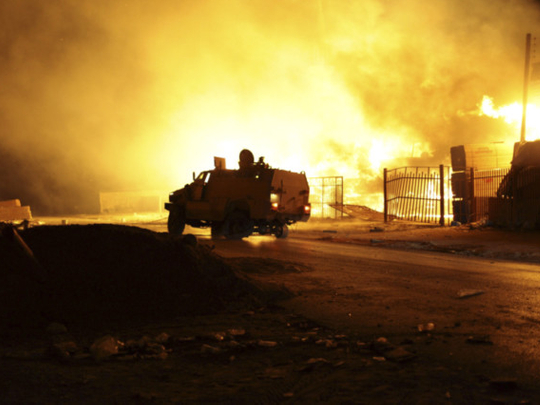
Tripoli: Regular thuds from rival militias’ battles in Tripoli set the rhythm of daily life for the Libyan capital’s residents, busy coping with power cuts and petrol shortages.
Noise from the clashes between the nationalists and Islamists’ heavy weaponry may swell or soften from one day to another but never stops.
The only visible sign is a column of black smoke rising from a fuel depot to the south of Tripoli ever since shooting set it alight at the end of July.
The battlefield is inaccessible to independent media, the toll is impossible to verify and the outcome uncertain.
Fighters from Misrata, east of Tripoli, and their Islamist allies now control the international airport, a strategic bridge and an old Libyan army base.
Their opponents, nationalist militiamen from Zintan in western Libya. The direct collateral victims of the fighting are people living in Tripoli’s southern neighbourhoods, who have fled in large numbers.
A thousand families have sought refuge in Tarhuna and 700 more in Bani Walid, officials in the two towns south-east of Tripoli say.
For other people in the capital, the clashes just add to the difficulty of getting through each day.
“Power cuts last nine hours a day and we are never warned about them,” complains 60 year-old Ali Tajuri, a resident of eastern Tripoli.
“The cuts weren’t so bad during the revolt against Muammar Gaddafi,” the long-time dictator overthrown in 2011, said the worker for a foreign company.
The power outages have disrupted life in the capital, where many shops are shut, civil servants have abandoned their posts and public services are practically at a standstill.
The national electricity company warned on Monday of a “risk of a general power cut unless network maintenance is carried out in the east of the country.”
“Four hours of waiting then he nips in front of me,” moans a driver outside a petrol station in the heart of the capital.
The two young men quickly come to blows and police monitoring the petrol station struggle to separate them.
The whole queue slams the government, powerless amid the chaos and which has decamped with parliament to Tobruk, 1,600km east of Tripoli, for security reasons.
Eventually, each driver fills up with petrol and has the car logbook stamped to prevent profiteering, though the black market is nevertheless flourishing.
“I filled up for 7 dinars (Dh20.9 at the official rate) and that costs 55 to 70 dinars on the black market,” says taxi driver Ahmad Al Huni, who often uses petrol touts to avoid the long queues.
Millions of litres of petrol went up in smoke when the southern Tripoli fuel depot caught fire and the distribution company has been supplying Tripoli from small tankers docked at the port.
But it is clearly not enough. Many Tripoli petrol stations are shut down and the rest open only when a fresh delivery arrives.












